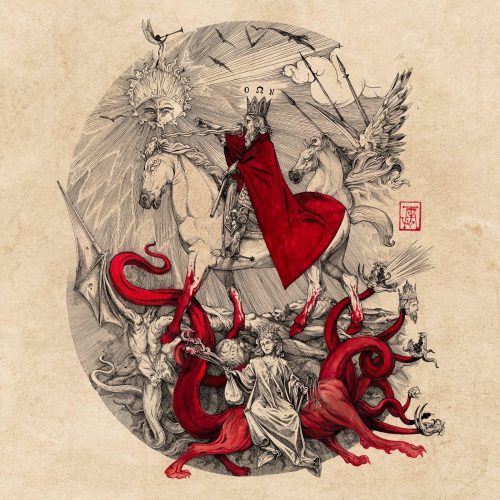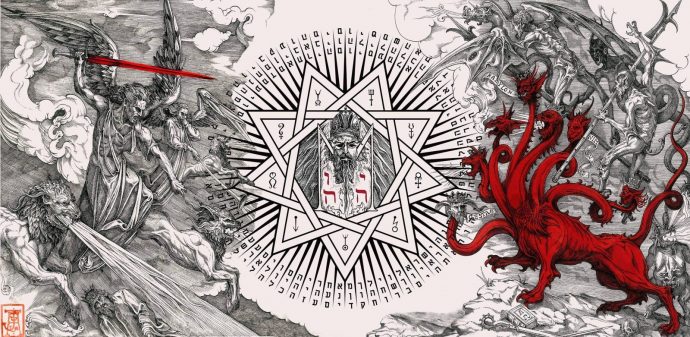(This is Andy Synn‘s review of the new album by the Swedish band Mephorash, which will be released by Shadow Records on April 18th.)
Black Metal, as we all know, contains multitudes. And within these multitudes it also contains (and practically revels in) a multitude of contradictions.
For instance, despite the genre’s seemingly endless (and not entirely unjustified) fixation on issues of authenticity and artistic purity, it’s also one of the most image-obsessed styles of Metal in existence.
That’s not necessarily a bad thing though. In fact I have a lot of respect for those bands who go to the extra effort of ensuring that their visual aesthetic – from their album art, to their promo shots, to their stage get-up – both reflects and complements their musical identity.
Oh, I’ve definitely seen it go very wrong in the past… just throwing on some cheap robes you bought off Amazon doesn’t suddenly make you more “occult”, and no amount of corpse-paint is ever going to make someone like Carach Angren look or sound any less embarrassing… but those bands who really go the extra mile, bands like Mephorash, who match their appearance to their art in every possible aspect, truly offer something a cut above the standard Black Metal experience.
Now, a word of warning before we go any further. Shem Ha Mephorash is a loooooong album. Too long for its own good really, clocking in at an extravagant seventy-four minutes in length (heck, if you add in “The Odious Gospels” from the band’s 2018 EP The Third Woe, like I have, it’s even longer still).
And, as a result, listening to it demands a significant investment of both time and energy from its audience, particularly in the latter stages of the record, where it occasionally becomes a little too easy to allow your attention to drift (something which I’ll say more about later on).
That being said, you have to respect the band’s outlandish ambitions in crafting an album of such size and intricacy in an era when so much pressure is being put on so many artists, both in the mainstream and the underground, to keep things shorter, more succinct, and more accessible.
Interestingly enough, while opener “King of Kings, Lord of Lords” provides an intriguing primer for what to expect from the album in general (particularly in terms of highlighting the record’s overall slower, more ominous pace and significantly more atmospheric approach), when experienced as part of a greater whole (rather than in isolation) you can see that its true purpose is to serve more as a lengthy introductory chapter to a much bigger story.
It’s not a bad track by any means (in fact I’d argue that it plays a vital role in introducing the album’s key themes and features), but it’s only with “Chant of Golgotha” that Shem Ha Mephorash really begins to coalesce into something special, as the song’s portentous, doom-laden opening minutes, all topped off with an array of choral keys and a singularly spine-chilling, spellbinding lead refrain, eventually give way to a scorching eruption of howling vocals and raging blastbeats, which in turn leads into a haunting passage of eerie ambience and rhythmic, ritualistic percussion, before the back half of the track draws all these elements together into one hypnotic whole.
Picking up seamlessly where its predecessor left off (it’s worth pointing out, by the way, that all the tracks on Shem Ha Mephorash are clearly designed to flow into one another, and often incorporate and iterate on, specific, but subtly different, melodic motifs from track to track), “Epitome I: Bottomless Infinite” builds upon the menacing melodic flourishes of “Chant of Golgotha” while also increasing both the metallic intensity and esoteric ambience of the record even further, striking a sublime balance between the aggressive and atmospheric sides of the band’s nature in the process.
The story continues in the haunting “Sanguinem”, which again teases the listener with scraps and shreds of moody melody designed to tie it and all the preceding songs together, while also adding newer and ever more intriguing layers of harmony and dissonance, mystery and malevolence, over the course of nine cryptically compelling minutes.
Unfortunately it’s at around this point that certain issues of length and pacing start to rear their ugly head, most notably during the unnecessarily drawn-out first half of “Epitome II: The Amrita of Vile Shapes”, with the overwhelmingly bleak and brooding pace of the album threatening to turn from “hypnotic” to “homogenous”, resulting in a distinct dynamic lull that even the somewhat punchier and more provocative strains of “Relics of Elohim” can’t quite overcome.
Thankfully, the added grandeur and grim intensity of “777: The Third Woe” successfully pulls things back in the right direction, smoothly setting everything up for the black magic majesty of the title-track – which, at a shade over fifteen minutes in length, is both one of the most demanding, and arguably most satisfying, compositions on the entire record – to bring the album to a fittingly climactic and captivating conclusion.
Make no mistake about it, the pseudo-rebirth of Mephorash, which began with 2015’s Rites of Nullification (or, if you want to be really accurate, the preceding EP Sfaíra ti̱s fo̱tiás) has been a real joy to experience, both as a simple listener and as someone interested in the layers of deeper meaning behind the music.
And while Shem Ha Mephorash may have its flaws, there’s no denying that it represents yet another epic milestone in the band’s ongoing evolution towards their inevitable apotheosis.
PRE-ORDER:
https://helterskelterproductions.bandcamp.com/album/shem-ha-mephorash
MEPHORASH:
https://www.facebook.com/Mephorash/
*Explicit* Mephorash – Sanguinem Official Music Video from Mephorash on Vimeo.




Honestly, it’s not the length of album. It’s just too much of goodness in one album.
Or evil. My top 10 for 2019.
Good review, apart from the stupid Carach Angren comment. What the hell was that about?
especially since Carach have the best corpse paint. dumb!
What evil shit is that? I don’t like it when BM goes theological (or political), especially when its some religion from the desert. This just seems to be one more wannabe occult band with a substitution of Satan with Qliphoth, ohhh how inventive. Anyway, Sweden never produced any good BM, the sound is slow and lame, not powerful at all, the vocals are some kind of tortured monotone growls and the melodies don’t convince with creativity. Just another bad copy of a bad example like Rotting Christ.
Actully the spiritual foundation of Mephorash lies within the highly researched tradition that is provided by G. De Laval. Its not about replacing Satan, (he is present in his own right) but about other things.